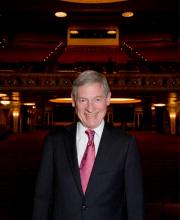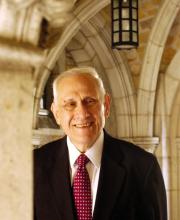The Jefferson Lecture in the Humanities, established by the National Endowment for the Humanities in 1972, is the highest honor the federal government confers for distinguished intellectual achievement in the humanities.
Jefferson Lecture
Prior Jefferson Lecturers
-
1972 Jefferson Lecturer Lionel Trilling
"Mind in the Modern World" -
1973 Jefferson Lecturer Erik Erikson
"Dimensions of a New Identity" -
1974 Jefferson Lecturer Robert Penn Warren
"Poetry and Democracy" -
1975 Jefferson Lecturer Paul A. Freund
"Liberty: The Great Disorder of Speech" -
1976 Jefferson Lecturer John Hope Franklin
"Racial Equality in America" -
1977 Jefferson Lecturer Saul Bellow
"The Writer and His Country Look Each Other Over" -
1978 Jefferson Lecturer C. Vann Woodward
"The European Vision of America" -
1979 Jefferson Lecturer Edward Shils
"Render Unto Caesar: Government, Society, and Universities in their Reciprocal Rights and Duties" -
1980 Jefferson Lecturer Barbara Tuchman
"Mankind's Better Moments" -
1981 Jefferson Lecturer Gerald Holton
"Where is Science Taking Us?" -
1982 Jefferson Lecturer Emily T. Vermeule
"Greeks and Barbarians: The Classical Experience in the Larger World" -
1983 Jefferson Lecturer Jaroslav Pelikan
"The Vindication of Tradition" -
1984 Jefferson Lecturer Sidney Hook
"Education in Defense of a Free Society" -
1985 Jefferson Lecturer Cleanth Brooks
"Literature and Technology" -
1986 Jefferson Lecturer Leszek Kolakowski
"The Idolatry of Politics" -
1987 Jefferson Lecturer Forrest McDonald
"The Intellectual World of the Founding Fathers" -
1988 Jefferson Lecturer Robert Nisbet
"The Present Age" -
1989 Jefferson Lecturer Walker Percy
"The Fateful Rift: The San Andreas Fault in the Modern Mind" -
1990 Jefferson Lecturer Bernard Lewis
"Western Civilization: A View from the East" -
1991 Jefferson Lecturer Gertrude Himmelfarb
"Of Heroes, Villains and Valets" -
1992 Jefferson Lecturer Bernard Knox
"The Oldest Dead White European Males" -
1993 Jefferson Lecturer Robert Conquest
"History, Humanity and Truth" -
1994 Jefferson Lecturer Gwendolyn Brooks
"Family Pictures" -
1995 Jefferson Lecturer Vincent Scully
"The Architecture of Community" -
1996 Jefferson Lecturer Toni Morrison
"The Future of Time" -
1997 Jefferson Lecturer Stephen Toulmin
"A Dissenter's Story" -
1998 Jefferson Lecturer Bernard Bailyn
"To Begin the World Anew: Politics and the Creative Imagination" -
1999 Jefferson Lecturer Caroline Walker Bynum
"Shape and History: Metamorphosis in the Western Tradition"












